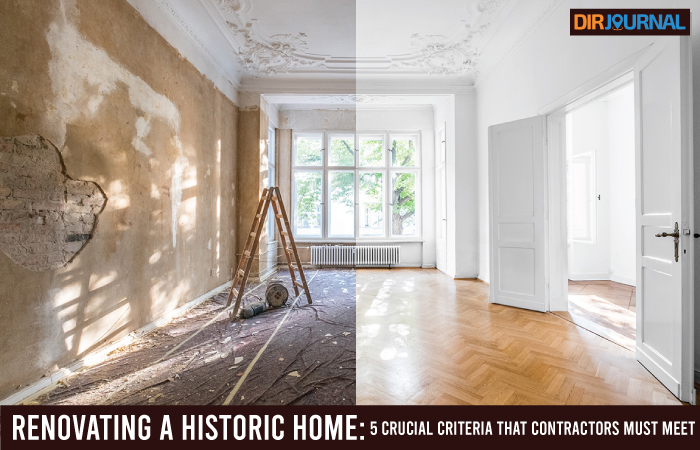When you are building or renovating your dream home, you are facing hundreds of challenges – with a million things to keep in mind.
But renovating a historic home is a particularly demanding undertaking. From maintaining the integrity of the structure and its overall character to attaining all the necessary permits, there are many hurdles to overcome.
In all of this, a competent, efficient contractor can be an invaluable ally. They can bring expertise, experience, and imagination to the table. Choose the wrong contractor, though, and they quickly turn into yet another headache to deal with.
To help you choose well, here are the five most important things to look out for when on the search for a contractor for your historic home renovation.
1 – Specialization
Just hiring the nearest contractor might boost the local economy, but it can be a grave mistake. Especially if you’re living in a smaller town, where most contracting work is generalized.
Renovating historic homes poses countless highly specific challenges. Hiring a contractor who is specialized in doing precisely this sort of work saves time and improves the quality of work. It will also prevent a general contractor from staring at 18th-century hand-crafted woodwork, wondering how to best deal with it.
The good news is that these days, there are countless contractors who have made specific niches their own. From contractors specialized in the federal colonial home style in Virginia to French provincial style custom home builders – anything is possible if you scour the internet for long enough.
2 – Recommendations
If you’re unsure where to start looking, or reluctant to hit the internet straight away, you can first try to find off-line recommendations. In any case, recommendations are a vital prerequisite that any contractor should meet.
A good place to start are fellow historic homeowners – especially if they recently had work done. Look for projects in your area that appeal to you, then contact the owners and ask who worked on it.
Another feasible way to go is contacting your State Historic Preservation Officer (SHPO), as well as local historical societies and your local preservation review board.
If a contractor comes recommended by one or several of these sources, this is a massive plus in their favor. Still, it is also essential to check online reviews during your selection process.
3 – Reference Projects
Once you’ve narrowed your selection down a little, you can start looking at reference projects.
Many contractors have a portfolio of completed projects on their websites, which point out particular challenges and how they were dealt with. If none are given, call and ask for a list.
Trustworthy and reliable contractors should not hesitate to share their portfolio, so that you can convince yourself in person of the quality of their work.
4 – Official Qualifications
Another feature to look out for in contractors when doing work on a historic home is their official qualifications.
Ask who will be handling your job, and do some background research. How long have they been with the firm? What is their work experience? How many projects have they worked on previously?
See if the contractor can provide you with an Architect’s Qualifications Statement (B305), or a Contractor’s Qualifications Statement (A305). These are detailed listings of anything from registration status and personnel to related professional services and potential conflicts of interest.
5 – Transparency and Administrative Efficiency
Finally, when contacting various contractors during your search, it’s also crucial to pay attention to how your requests are processed administratively, and how transparently everything is being handled.
If it takes a company days or even weeks to get back to you, they send the wrong documents, or try to placate you with incomplete information, you can cross them off your list. If anything, this is an indication of a nightmarish billing process to come if you hire them for your project.
This is also the point at which you should pay particular attention to the legal fine print. How forthcoming are the firms with their terms and services, contractual phrasings, price lists, and insurance requirements?
If you find a contractor who supplies detailed information promptly and transparently, you’ve struck gold.
The Bottom Line
In all likelihood, finding a qualified, reliable contractor for your historic home renovation will take some time and effort. Vetting individual companies alone may take a few weeks.
However, in the grand scheme of things, you’re infinitely better off digging into research before the project even begins – rather than having to deal with an incompetent or even fraudulent contractor.
A contractor with good recommendations, transparent and efficient administration, and the necessary qualifications and expertise for your project is the right partner to make your historic home shine.













